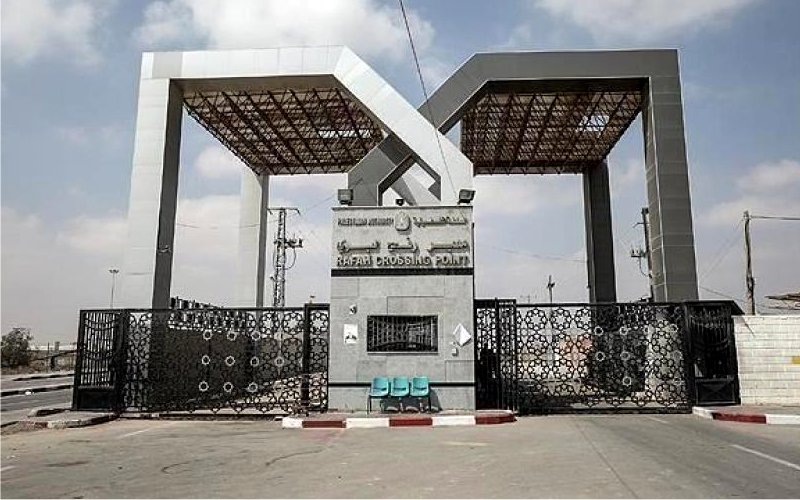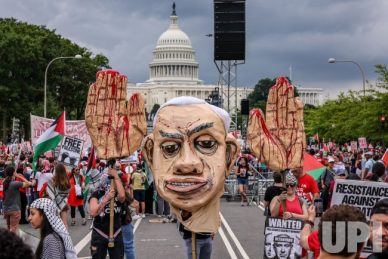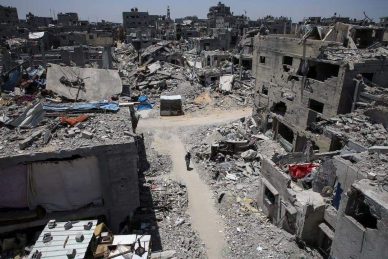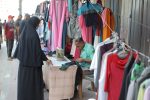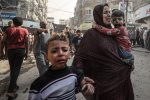RAFAH, (PIC)
Recreating a scene from the occupation, Israeli tanks entered Rafah Crossing, reaching the Egyptian gate and hoisting the Israeli flag within it. Israel seemingly aimed to project a victorious image by occupying a civilian facility that serves as a lifeline for over 2.3 million people in the Gaza Strip.
From a vulnerable border area, Israeli tanks advanced to occupy Rafah Crossing, the sole gateway for Gaza to the outside world, shutting it down and rendering it non-operational. The area has been turned into a virtual prison, divided into at least two sections where residents live in tents amidst rubble, enduring constant shelling.
With the occupation of Rafah Crossing, the isolation of the Gaza Strip from the outside world is complete, depriving patients and the wounded of access to medical treatment and preventing the flow of humanitarian aid trucks. This exacerbates the already deteriorating humanitarian situation due to the ongoing conflict over the past seven months.
Israeli military vehicles staged a demonstration early Tuesday morning at Rafah Crossing, located southeast of Rafah City near the border with Egypt, following Israeli warnings to residents of eastern neighborhoods to evacuate their homes, indicating an imminent ground military operation.
The Crossings and Borders Authority reported that Israel has closed the crossing for the second consecutive day on Wednesday, with Israeli vehicles on the Palestinian side of the crossing. Meanwhile, the entry of aid trucks remains blocked for the fourth consecutive day, whether through Rafah Crossing or Kerem Shalom Crossing.
Humanitarian disasters
Local and international organizations view the occupation of Rafah Crossing and the closure of Kerem Shalom Crossing, both located south of Rafah City, as exacerbating the humanitarian and health crises that have plagued the small coastal enclave since the outbreak of the Israeli war following the October 7th attack last year.
Official estimates suggest that 11,000 war casualties and 10,000 cancer patients are in desperate need of travel for life-saving treatment abroad, after Israeli forces deliberately destroyed hospitals, including the only Turkish-Palestinian Friendship Hospital specializing in cancer treatment.
Humanitarian response
The United Nations Relief and Works Agency for Palestine Refugees (UNRWA) stated on its WhatsApp account that “the continued interruption of aid and fuel supplies through Rafah Crossing will halt humanitarian response throughout the Gaza Strip.”
The UN agency warned that “the famine disaster faced by people, especially in northern Gaza, will worsen if supplies are stopped,” referring to hundreds of thousands of Palestinians in Gaza City and northern Gaza, isolated by Israel from the southern half.
The occupation forces reopened the Kerem Shalom crossing following the temporary ceasefire in November of last year. According to the Government Media Office (GMO), 190 trucks loaded with commercial goods and various humanitarian aids enter daily through it, alongside a smaller number of trucks via the Rafah crossing, including fuel and cooking gas trucks.
Before the outbreak of the war, more than 500 trucks loaded with various types of goods and humanitarian needs used to enter daily through Kerem Shalom, in addition to fuel.
Genocidal war
The head of the GMO in Gaza, Ismail al-Thawabta, said that the occupation’s decision to stop aid and close the Rafah and Kerem Shalom crossings comes in the context of “continuing the war of genocide.” He added that “this would exacerbate the humanitarian situation in a twofold and catastrophic manner.”
According to al-Thawabta, the situation in eastern Rafah indicates a real humanitarian catastrophe, not only for this city alone but also extending to all the governorates of the Gaza Strip, which have been experiencing a tragic state of systematic starvation and shortages in supplies and aid for the past 7 consecutive months. Then comes the occupation’s decision to stop aid and close the crossings, which worsens the humanitarian situation in a catastrophic manner.
Political pressure
Karim al-Falahi confirmed that the occupation has effectively taken control of Rafah Crossing from the Palestinian side and violated the 1979 agreement and the 2005 protocol by deploying military units in the area.
In a military analysis for Al Jazeera, he stated that the incursion east of Rafah is limited, and the distance between the Gaza Strip and Rafah Crossing does not exceed 3 kilometers.
He explained that the areas currently controlled by the occupation forces are open and not suitable for defense by the resistance.
He said that the operation is limited in an attempt to reach an agreement and to exert more political pressure on the resistance rather than military pressure.
Israeli intentions
Palestinian factions in the Gaza Strip stated that the occupation and closure of Rafah Crossing and Kerem Shalom Commercial Crossing, along with military operations in Rafah, reveal the intentions of the occupation to commit massacres and humanitarian disasters.
The factions emphasized in a statement on Tuesday that the occupation began to cut food, humanitarian, and medical supply lines and prohibit the movement of passengers, wounded, and citizens, preventing the entry of food trucks that, if allowed, would only meet 5% of the daily needs.
They warned that the ground aggression on Rafah and the occupation and destruction of Rafah Crossing, along with the closure of Kerem Shalom Crossing, the only outlet for Gaza, means a humanitarian catastrophe targeting 2.3 million Palestinian citizens in Gaza.
They pointed out that the closure of remaining hospitals and health centers means “the actual killing of thousands of wounded, cancer patients, women, children, and others.” They said, “This is a clear aggression, with malicious intent, to thwart the efforts of mediators and challenge international and regional will, as well as popular will, especially after the resistance leadership, along with our people’s factions and forces, agreed to a proposal to stop the aggression and exchange prisoners.”

